Part 44: March 14 Broadcast

You are listening to BBC radio 4. In an hour, we will out on the field looking at the history of football. For the next hour, Professor David Stephenson will be presenting a documentary on the second 80 years war of the eighteenth century. This series will be running every third day, up to 50 episodes. If you want news of the current war in the Middle East please channel in to BBC radio 1.
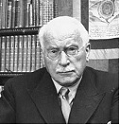 Good evening, and welcome to BBC radio 4. I’m Professor David Stephenson, professor of Dutch historical studies at Cambridge. This is the forty fourth part of our 50 episode special on the second 80 years war over Europe. Joining me for these broadcasts are fellow researchers and scholars Doctor Albert Andrews, specialist in German studies from the Berlin academy, Professor Robert Lowe, specialist in French studies at Cambridge, and a graduate student and technical assistant, Anton Thatcher. Last episode, we discussed the battle of Newcastle and the capture of Edinburgh.
Good evening, and welcome to BBC radio 4. I’m Professor David Stephenson, professor of Dutch historical studies at Cambridge. This is the forty fourth part of our 50 episode special on the second 80 years war over Europe. Joining me for these broadcasts are fellow researchers and scholars Doctor Albert Andrews, specialist in German studies from the Berlin academy, Professor Robert Lowe, specialist in French studies at Cambridge, and a graduate student and technical assistant, Anton Thatcher. Last episode, we discussed the battle of Newcastle and the capture of Edinburgh. The Dutch had closed in all around the British. Now, all that remained was the garrison at London, opposed directly by the Dutch guard. The British had less than two thousand men stationed at London, opposed by a similar number of the Dutch. However, the Dutch guard were itching for revenge after being pushed out of England, and this second assault gave the blue guard ample opportunity to retake London.
The Dutch had closed in all around the British. Now, all that remained was the garrison at London, opposed directly by the Dutch guard. The British had less than two thousand men stationed at London, opposed by a similar number of the Dutch. However, the Dutch guard were itching for revenge after being pushed out of England, and this second assault gave the blue guard ample opportunity to retake London.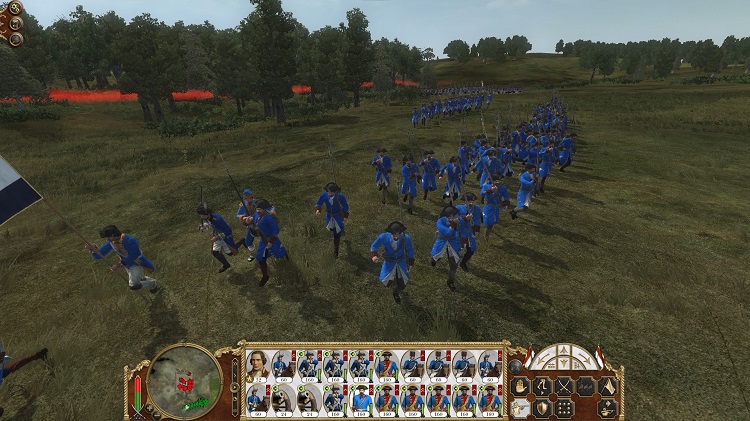
The blue guard, eager to get back into the walls of London.
 General Ruysch was just as eager to take London as anyone else had, but was not so stupid as to assault the walls directly. He was reckless enough to eschew the mortars, allowing them to be deployed to Scotland. He would have to make due with the shorter ranged howitzers, though these could also be used to fire the contact fuse explosive shells.
General Ruysch was just as eager to take London as anyone else had, but was not so stupid as to assault the walls directly. He was reckless enough to eschew the mortars, allowing them to be deployed to Scotland. He would have to make due with the shorter ranged howitzers, though these could also be used to fire the contact fuse explosive shells. 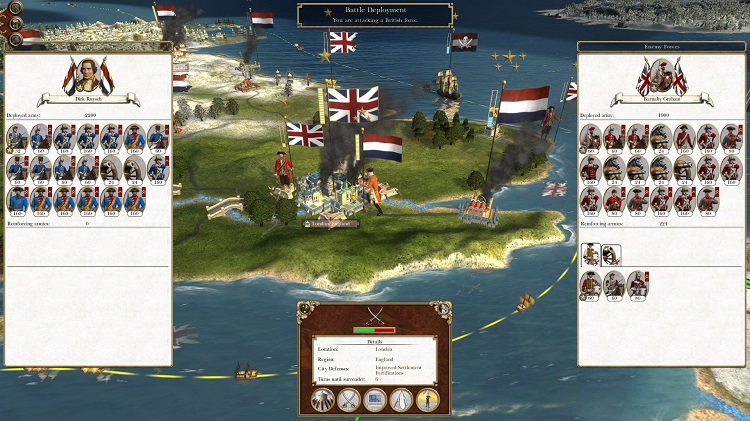
The Dutch prepared to do battle against the English in London. While the Dutch had brought howitzers, they neglected to bring the wall battering twelve pound cannons, meaning it would take a long while before the walls went down.
 The Dutch had to set into range of the cannons of the London fortress, meaning the British could return fire at the Dutch. The fortress walls were lightly armed with six pound cannon, making them easy to maneuver over the narrow battlements, and they were loaded only with basic cannon balls, making them relatively useless against infantry leaving Dutch casualties fairly low. By contrast, the Dutch explosive shells fired from the heavy howitzers were even more devastating than a mortar round, but at the same time, the shot had to land directly atop the battlements to produce any effect. Many went short, blowing dust and bricks from the walls, while others soared high over head into the main square, which was mostly empty.
The Dutch had to set into range of the cannons of the London fortress, meaning the British could return fire at the Dutch. The fortress walls were lightly armed with six pound cannon, making them easy to maneuver over the narrow battlements, and they were loaded only with basic cannon balls, making them relatively useless against infantry leaving Dutch casualties fairly low. By contrast, the Dutch explosive shells fired from the heavy howitzers were even more devastating than a mortar round, but at the same time, the shot had to land directly atop the battlements to produce any effect. Many went short, blowing dust and bricks from the walls, while others soared high over head into the main square, which was mostly empty. 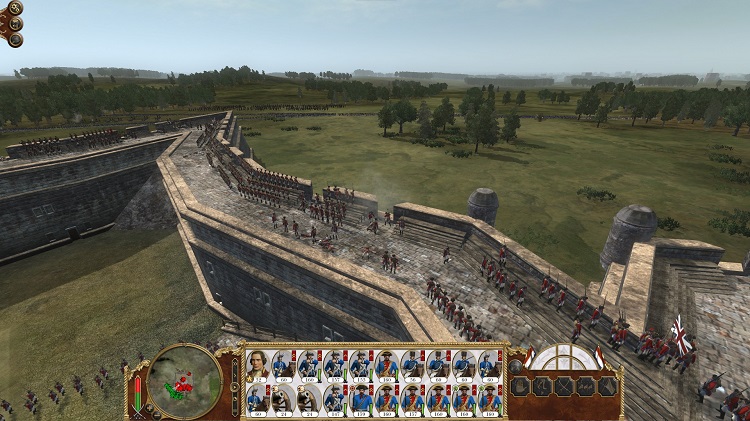
British infantry were returning fire, but the class of cannon was outmatched by the heavy Dutch howitzers.
 When a shell did land true however, the British found themselves knocked off the walls by the dozens, and casualties were rapidly destroying the English aligned along the battlements. Still, the walls were holding, and the Dutch could not be expected to advance along the main front just yet.
When a shell did land true however, the British found themselves knocked off the walls by the dozens, and casualties were rapidly destroying the English aligned along the battlements. Still, the walls were holding, and the Dutch could not be expected to advance along the main front just yet.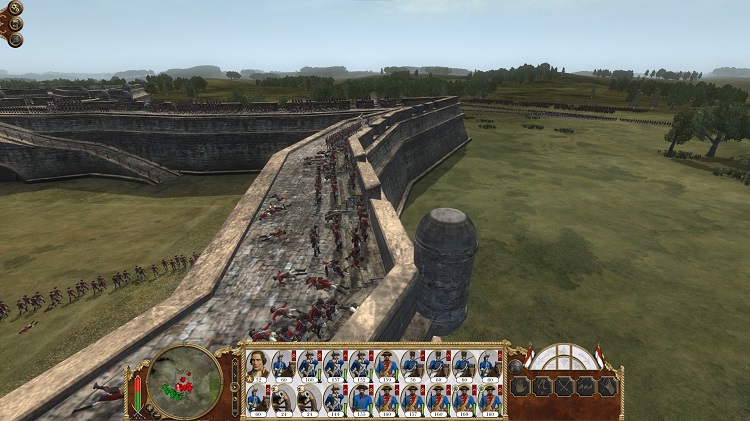
As the battle wore on, the occasional lucky shells were taking their toll on the British defenders.
 However, the British did have to remain wary of one particular weakness of their fortress. It had not yet been repaired since the first invasion, and as such, had a pair of gaps along the flank. While the Dutch approach had kept them away from that side, they could march across to exploit the opening. However, much in the same way the Dutch would have, the British moved their artillery battery to cover the gap. Any Dutch trying to assault from that angle would have to weather a major counter attack from the batteries.
However, the British did have to remain wary of one particular weakness of their fortress. It had not yet been repaired since the first invasion, and as such, had a pair of gaps along the flank. While the Dutch approach had kept them away from that side, they could march across to exploit the opening. However, much in the same way the Dutch would have, the British moved their artillery battery to cover the gap. Any Dutch trying to assault from that angle would have to weather a major counter attack from the batteries.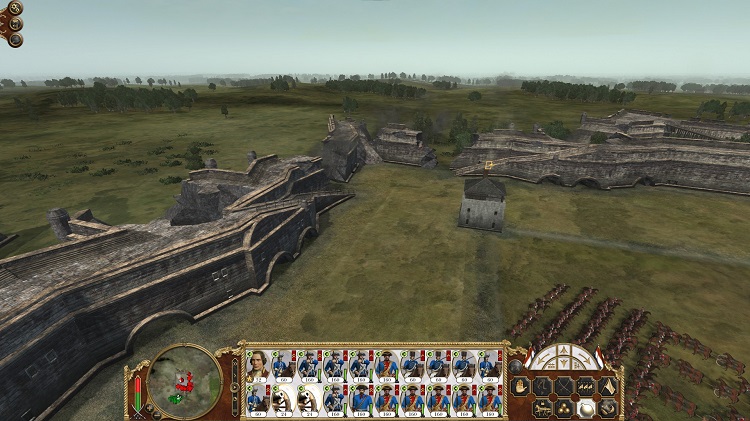
The British had not had the resources or man power to repair the fortress walls around London, and so the Dutch could exploit the gap at any time.
 And so the Dutch and English engaged in battery and counter battery fire, the Dutch perfectly content to wear away the British before attacking directly. They hoped to open another breach in the walls to allow an attack from many fronts. The howitzer however, was an ill choice firing at the fortifications, as the explosive shot shattered on impact, and did little to destroy stone masonry. A heavy twelve pound field artillery piece would have been superior.
And so the Dutch and English engaged in battery and counter battery fire, the Dutch perfectly content to wear away the British before attacking directly. They hoped to open another breach in the walls to allow an attack from many fronts. The howitzer however, was an ill choice firing at the fortifications, as the explosive shot shattered on impact, and did little to destroy stone masonry. A heavy twelve pound field artillery piece would have been superior.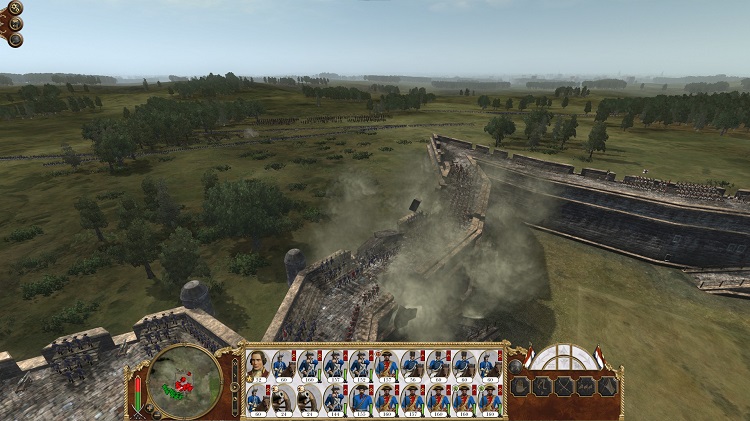
The sturdy masonry cracks but does not fail after hours of bombardment. Several men were knocked from the battlements to their death below, but on the whole, the effect was minimal.
 The British along the main front had been reduced to a fraction of their former numbers after hours of bombardment to the loss of only a hundred Dutch. While Ruysch could have waited even longer, waiting until his artillery had clawed through the enemy walls, he opted to charge. While multiple battalions of line would be held in reserve to watch the howitzers, all six squadrons of cavalry would force the breach, while the guard would overtake the walls, capture the gate houses, and allow the entry of the remainder of his forces.
The British along the main front had been reduced to a fraction of their former numbers after hours of bombardment to the loss of only a hundred Dutch. While Ruysch could have waited even longer, waiting until his artillery had clawed through the enemy walls, he opted to charge. While multiple battalions of line would be held in reserve to watch the howitzers, all six squadrons of cavalry would force the breach, while the guard would overtake the walls, capture the gate houses, and allow the entry of the remainder of his forces.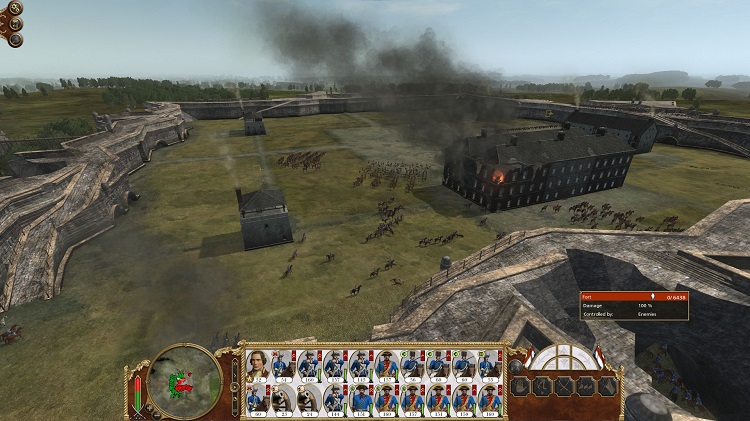
By staggering their squadrons, some of the Dutch cavalry made it through the gap through British grape shot. The lead elements were intercepted by British cavalry, but the remainder managed to take the British artillery battery.
 The Dutch Holland guard managed to take the walls with little remaining opposition, the cavalry moving around the gap forcing the British to move their forces. With the walls secure, the Dutch were able to move the blue guard into line in the fortress. Backed by more of the Holland guard, the Dutch began a line battle over the center of the British fort.
The Dutch Holland guard managed to take the walls with little remaining opposition, the cavalry moving around the gap forcing the British to move their forces. With the walls secure, the Dutch were able to move the blue guard into line in the fortress. Backed by more of the Holland guard, the Dutch began a line battle over the center of the British fort.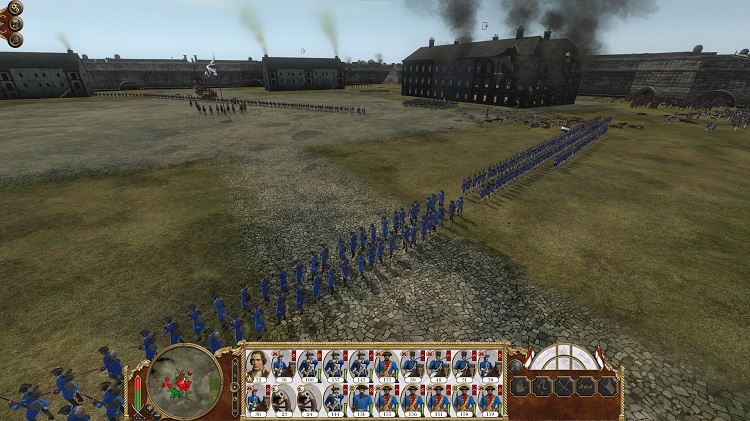
Dutch troops rush the courtyard, having met minimal resistance on the walls.
 The buildings within the fortress, such as the armoury, the command headquarters and the troops barracks all were breaking up the lines, and forcing each battalion to square off against another. Forced to fight one to one, the British were having a hard time against the superior Holland guard. This gave Dutch control over much of the fortress, the blue guard taking the center and spreading out.
The buildings within the fortress, such as the armoury, the command headquarters and the troops barracks all were breaking up the lines, and forcing each battalion to square off against another. Forced to fight one to one, the British were having a hard time against the superior Holland guard. This gave Dutch control over much of the fortress, the blue guard taking the center and spreading out.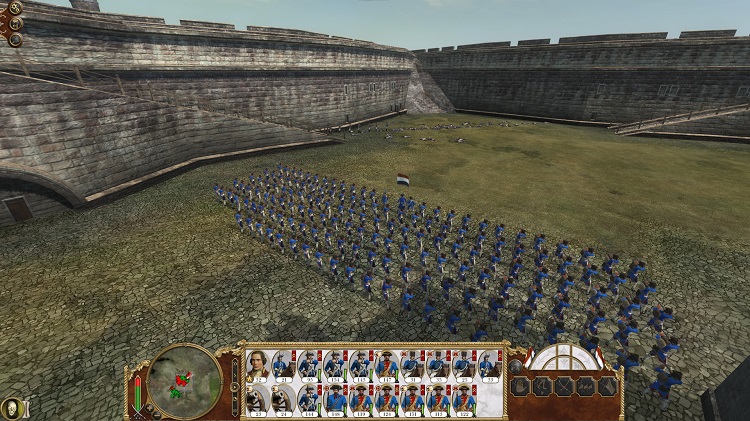
Crowding due to the various buildings around the interior walls forced the Dutch and British to sent their units to defend specific choke points where battalions would duel one another one on one. The Dutch guard generally got the better of these exchanges.
 This prompted a British charge to the center to prevent the blue guard from taking down the British flag, and they did manage to push a gap through the blue guard. However, the Dutch counter assault, the guard collapsing in around them managed to destroy the last central battalion of British troops.
This prompted a British charge to the center to prevent the blue guard from taking down the British flag, and they did manage to push a gap through the blue guard. However, the Dutch counter assault, the guard collapsing in around them managed to destroy the last central battalion of British troops.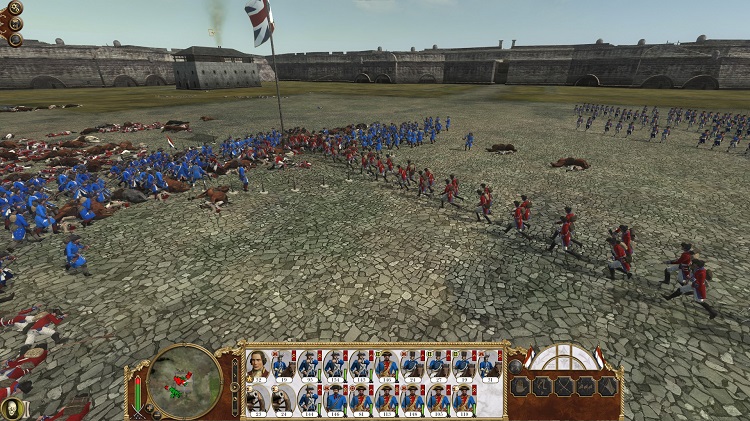
The flag held no tactical value on a technical level, but the flag over the courtyard signified ownership. The changing of the flag held a tremendous psychological value.
 Another pair of British battalions, bloodied and desperate after fending off a battalion the Holland guard tried to move to the center, but were blocked in by more battalions of the Holland guard as well as the Dutch regiments of horse. They were forced to try and charge their way through the Dutch lines, and charged into another battalion of the guard, knowing if they did push through, there would still be more guard at the center.
Another pair of British battalions, bloodied and desperate after fending off a battalion the Holland guard tried to move to the center, but were blocked in by more battalions of the Holland guard as well as the Dutch regiments of horse. They were forced to try and charge their way through the Dutch lines, and charged into another battalion of the guard, knowing if they did push through, there would still be more guard at the center.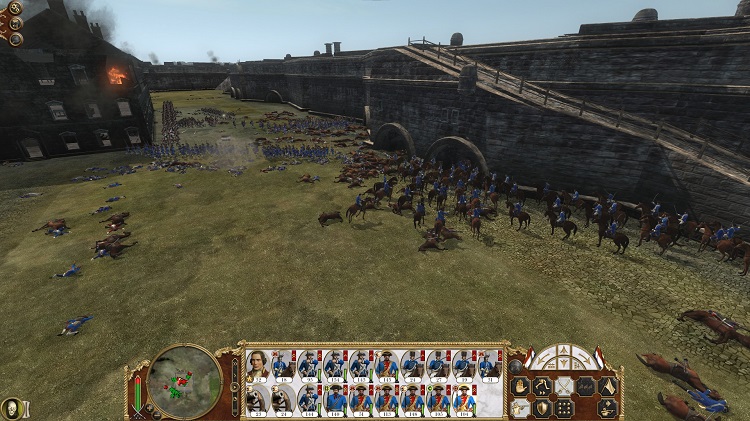
British forces charge into the Dutch lines in what British infantry had come to refer to as "that bloody alleyway." Obscured by the command headquarters, these men were unaware that the rest of the British army in London lay dead.
 The British were down to a pair of battered battalions, and much of the Dutch guard remained intact. As the Dutch flag went up over the fortress at London, the remaining British forces, demoralized, exhausted and beaten surrendered.
The British were down to a pair of battered battalions, and much of the Dutch guard remained intact. As the Dutch flag went up over the fortress at London, the remaining British forces, demoralized, exhausted and beaten surrendered.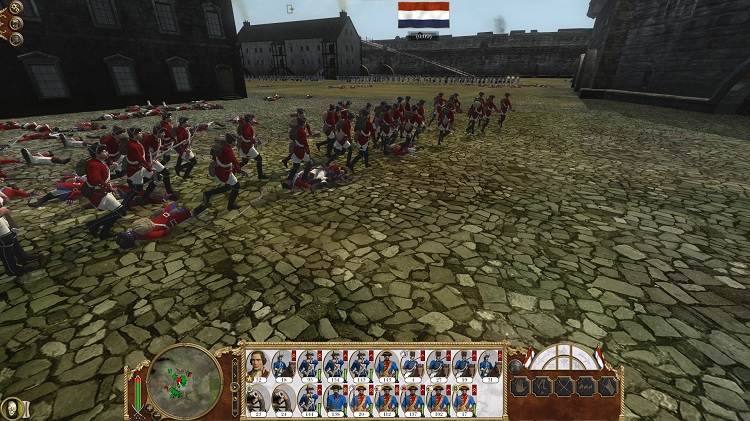
The British infantry make a break from that bloody alleyway to see the Dutch flag raised over the center, guarded by the blue guard, and without a single red coat in sight. The last few British soldiers surrender.
 This was exactly the decisive victory the Dutch government had needed. Within three months from their departure from Brest, the Dutch had gained control over Ireland, Scotland, England and Whales. Ten thousand Dutch had crossed the channel, less than half would live to return. Britain had suffered far worse for it. Of the six thousand defending Scotland, none remained alive, and two thousand defending England, only two hundred remained alive. Despite the horrendous losses the Dutch army had sustained, it could not be called a pyrrhic victory. All of the British Isles had fallen, and with no threats to the Dutch along the entirety of Western Europe, the utter devastation the Dutch army had endured would be no deterrent to future success.
This was exactly the decisive victory the Dutch government had needed. Within three months from their departure from Brest, the Dutch had gained control over Ireland, Scotland, England and Whales. Ten thousand Dutch had crossed the channel, less than half would live to return. Britain had suffered far worse for it. Of the six thousand defending Scotland, none remained alive, and two thousand defending England, only two hundred remained alive. Despite the horrendous losses the Dutch army had sustained, it could not be called a pyrrhic victory. All of the British Isles had fallen, and with no threats to the Dutch along the entirety of Western Europe, the utter devastation the Dutch army had endured would be no deterrent to future success.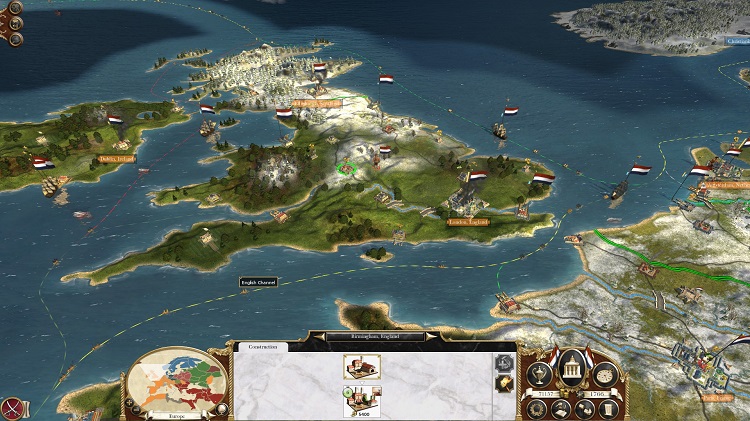
All of Britain, conquered by the Dutch.
 This would not be the last the Dutch had seen of the British soldiers. With rebels gathering in the countryside, the guard couldn’t relax on their laurels. Unlike last time however, the Dutch were well prepared to put down any uprising or revolt the English could throw at them.
This would not be the last the Dutch had seen of the British soldiers. With rebels gathering in the countryside, the guard couldn’t relax on their laurels. Unlike last time however, the Dutch were well prepared to put down any uprising or revolt the English could throw at them.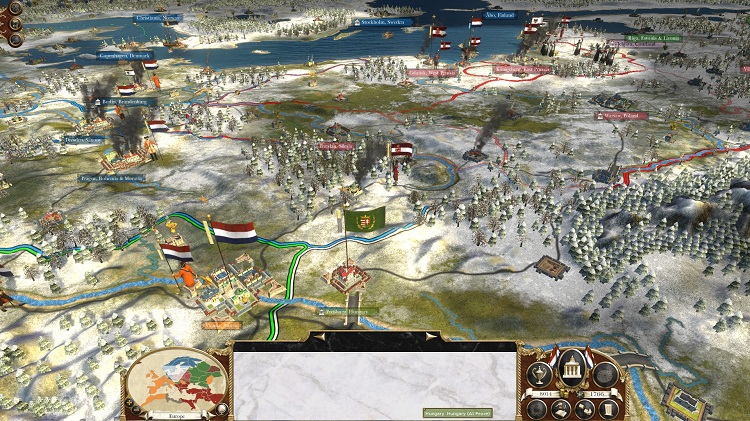
The Dutch were also well prepared in the East. The tremendous cost of their massive army, now over forty thousand strong was becoming a burden, and the Dutch were waiting for an opportunity to disband massive portions of their army.
 Victory was cautiously received in Amsterdam and abroad. After the first victory proved to be only temporary, the Federation was skeptical about the permanency of their position in London. However, as more reports crept in, and intelligence continued to provide evidence that there were no English forces left in England, the Republicans had started to gain increasing support.
Victory was cautiously received in Amsterdam and abroad. After the first victory proved to be only temporary, the Federation was skeptical about the permanency of their position in London. However, as more reports crept in, and intelligence continued to provide evidence that there were no English forces left in England, the Republicans had started to gain increasing support. It was a close thing. While the Orange party continued to maintain a skeptical tone over the Republican’s ability to keep a hold over England, the growing evidence that they could began to crush the rumours. By the time elections came about, the Dutch Republican party had won their first majority government in over a decade.
It was a close thing. While the Orange party continued to maintain a skeptical tone over the Republican’s ability to keep a hold over England, the growing evidence that they could began to crush the rumours. By the time elections came about, the Dutch Republican party had won their first majority government in over a decade.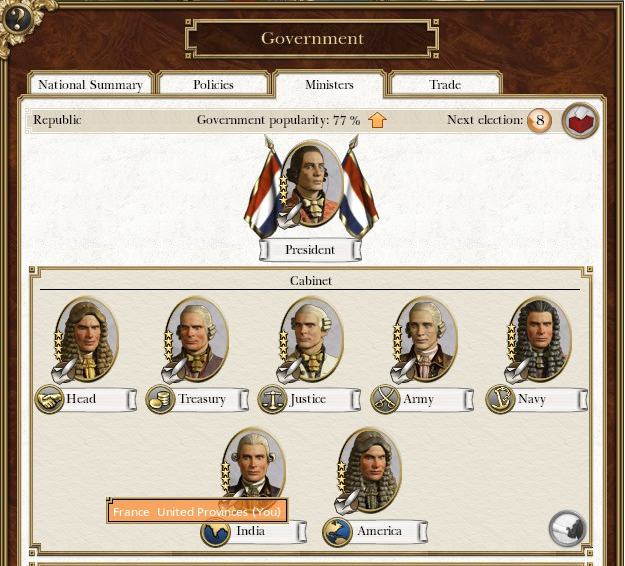
The Republicans in a full victory.
 This time, the government was led by Statdholder Gerard Quinten’s, the younger brother of the previous Statdholder Joordan. While Joordan was a man of gentle politics and economics, taking the reigns as Statholder only because it had been de-emphasized in peace time, Gerard had been a colonel in the American force, and was present in the siege of Boston, Albany and Philadelphia. He had returned home to a life of politics when the British had been pushed off the Eastern seaboard of North America, but unlike his brother, he was considered a firm candidate for a wartime minister and as the supreme commander over the Dutch forces against the crusading polish armies.
This time, the government was led by Statdholder Gerard Quinten’s, the younger brother of the previous Statdholder Joordan. While Joordan was a man of gentle politics and economics, taking the reigns as Statholder only because it had been de-emphasized in peace time, Gerard had been a colonel in the American force, and was present in the siege of Boston, Albany and Philadelphia. He had returned home to a life of politics when the British had been pushed off the Eastern seaboard of North America, but unlike his brother, he was considered a firm candidate for a wartime minister and as the supreme commander over the Dutch forces against the crusading polish armies.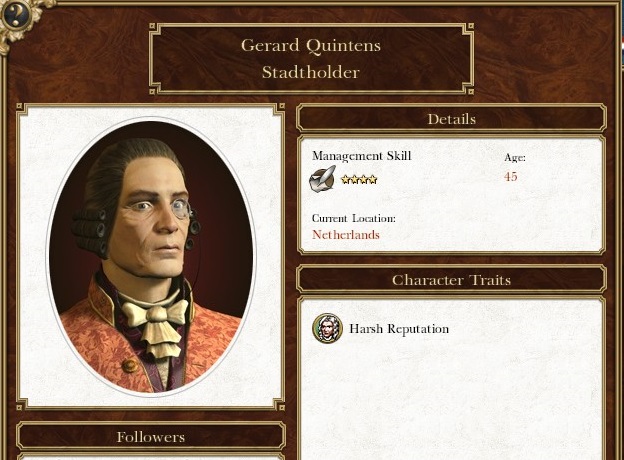
Joord Quintens, second Statholder in a family that would became a cornerstone of Dutch politics.
 The diplomatic head of state was Nikolaas van der Vinne. He was actually a bank manager and investment adviser in Amsterdam rather than a politician, but was a close friend and confident of the former head of state, and so was asked to fill the position within the party, as there was no one else qualified. While his expertise would have better suited him in a position as the treasury minister, he was the most eloquent speaker in the Republican party, and a lack of others with his professional, business like tact made him a reliable choice.
The diplomatic head of state was Nikolaas van der Vinne. He was actually a bank manager and investment adviser in Amsterdam rather than a politician, but was a close friend and confident of the former head of state, and so was asked to fill the position within the party, as there was no one else qualified. While his expertise would have better suited him in a position as the treasury minister, he was the most eloquent speaker in the Republican party, and a lack of others with his professional, business like tact made him a reliable choice.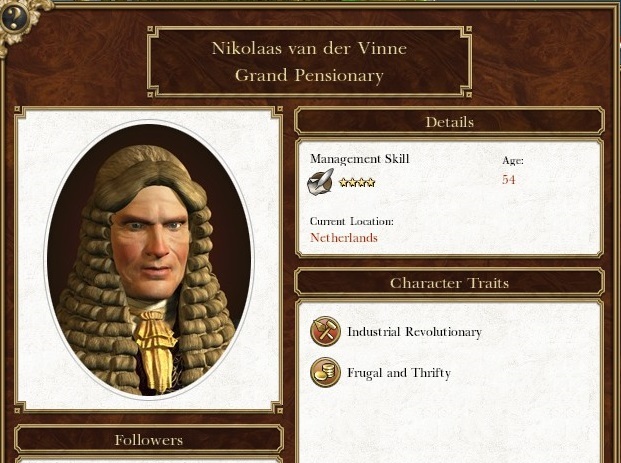
Nikolaas van der Vinne was the oldest member of the Republican party, and many viewed him as a wise man.
 The minister of the treasury was Hector Cuyp, an owner of one of the more successful estates just north of the Hague. His land reforms and policies had earned him a significant amount of money, but his countryside economics made him less suitable for the overarching industrial economy of the Dutch empire. However, since he was what others call a “country speaker” and unreliable in presenting himself and during negotiations, he could not have switched roles with Vinne.
The minister of the treasury was Hector Cuyp, an owner of one of the more successful estates just north of the Hague. His land reforms and policies had earned him a significant amount of money, but his countryside economics made him less suitable for the overarching industrial economy of the Dutch empire. However, since he was what others call a “country speaker” and unreliable in presenting himself and during negotiations, he could not have switched roles with Vinne.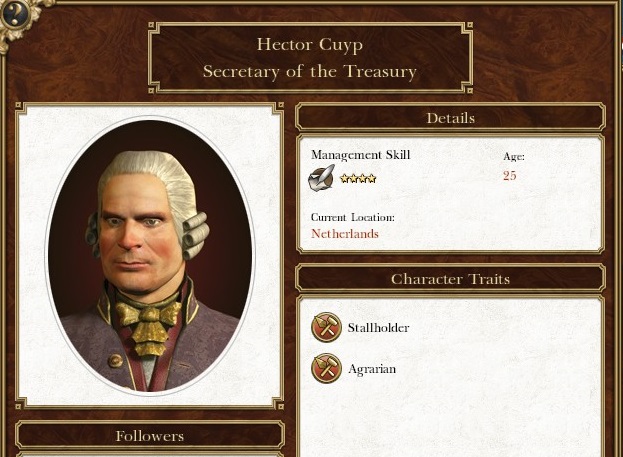
Vinne was too young and inexperienced to truly excel in his role, but he was bright and keen. The youngest of the Republican ministers, he would live a long life in politics.
 Gottfried Duiver was the Justice minister of the Republican party. His life had been a turbulent one prior to his election, and he had held several occupations. He had once been a harsh judge in India before finding religion, converted by the teaching of their own preachers abroad. He quit his job, living a monastic life for five years before returning to Amsterdam, having grown out of that phase of his life. Still a fairly young man, he came into politics in Austria, where he had taken to an idle lifestyle discussing religion, philosophy and justice with intellectuals in Viennese coffee shops. Eventually, he was picked up by the Republican party as a clerk where he eventually won over enough support to run.
Gottfried Duiver was the Justice minister of the Republican party. His life had been a turbulent one prior to his election, and he had held several occupations. He had once been a harsh judge in India before finding religion, converted by the teaching of their own preachers abroad. He quit his job, living a monastic life for five years before returning to Amsterdam, having grown out of that phase of his life. Still a fairly young man, he came into politics in Austria, where he had taken to an idle lifestyle discussing religion, philosophy and justice with intellectuals in Viennese coffee shops. Eventually, he was picked up by the Republican party as a clerk where he eventually won over enough support to run.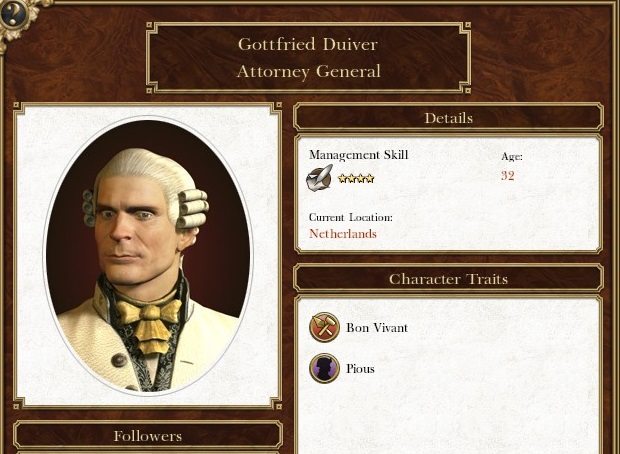
Duiver embodied a concept strange for a Judge. He believed that forgiveness was the greatest good. Even so, he did not turn away from the realities of his post.
 The minister of defence was another man from the country estates, Maas de Houtman. Using his wealth, he had not found the same economic success as Cuyp, but unlike Cuyp, he had spent a considerable fortune on the running and maintenance of the Utrecht militia. As the militia battalions that were abroad from the time of General Ouwerkerk, and still required maintenance, Houtman made sure to finance and train a constant string of replacements to be sent abroad, and welcome back militiamen who were returning from their tour of duty. He had also been one of the former minister of defence’ personal confident, his estate being the second home of Wendels.
The minister of defence was another man from the country estates, Maas de Houtman. Using his wealth, he had not found the same economic success as Cuyp, but unlike Cuyp, he had spent a considerable fortune on the running and maintenance of the Utrecht militia. As the militia battalions that were abroad from the time of General Ouwerkerk, and still required maintenance, Houtman made sure to finance and train a constant string of replacements to be sent abroad, and welcome back militiamen who were returning from their tour of duty. He had also been one of the former minister of defence’ personal confident, his estate being the second home of Wendels.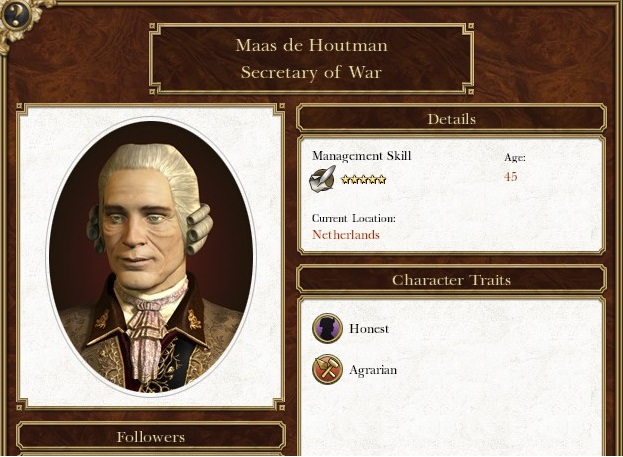
Cuyp was a fan of the militia, and worshiped them as though they were heroes. A young man during the heroic years of the Dutch militia, he became their strongest financier.
 The last European minister was Maarten van Kessel, Lord Admiral to the Dutch navy. He had not been a navy man at all, but instead owned a tinning factory in Rotterdam, as well as the farms that provided the produce for his cannery. A wealthy man with little interest in the navy, but plenty of interest in politics in general, it is likely that he purchased his position. Despite this, he was a relatively efficient administrator, but the government bill for canned rations allotted to the navy was certainly suspect. Despite this, costs for the navy had gone down somewhat with the reliance on fewer living animals aboard ships to provide meat for the crew. A practice that required a tremendous amount of space and hundreds of guilders in feed and water for the animals.
The last European minister was Maarten van Kessel, Lord Admiral to the Dutch navy. He had not been a navy man at all, but instead owned a tinning factory in Rotterdam, as well as the farms that provided the produce for his cannery. A wealthy man with little interest in the navy, but plenty of interest in politics in general, it is likely that he purchased his position. Despite this, he was a relatively efficient administrator, but the government bill for canned rations allotted to the navy was certainly suspect. Despite this, costs for the navy had gone down somewhat with the reliance on fewer living animals aboard ships to provide meat for the crew. A practice that required a tremendous amount of space and hundreds of guilders in feed and water for the animals.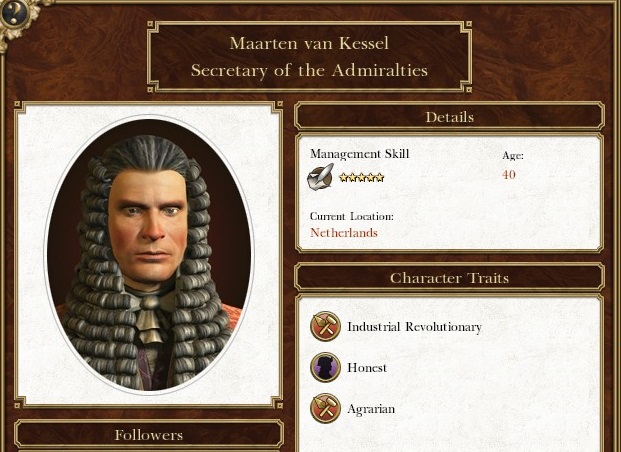
van Kessel, of van Kessel foods. Today, they mostly can salt fish, but they started off selling MREs to the navy.
 Abroad, the Dutch were led by Jurg Drakenborch in India. Another judge from India, Drakenborch was a harsh man by reputation, and he abhorred the very idea of change to the status quo. Civil rights for the local people of India continued to find themselves increasingly oppressed, whereas a decade ago, the Dutch ministers had largely ignored them.
Abroad, the Dutch were led by Jurg Drakenborch in India. Another judge from India, Drakenborch was a harsh man by reputation, and he abhorred the very idea of change to the status quo. Civil rights for the local people of India continued to find themselves increasingly oppressed, whereas a decade ago, the Dutch ministers had largely ignored them.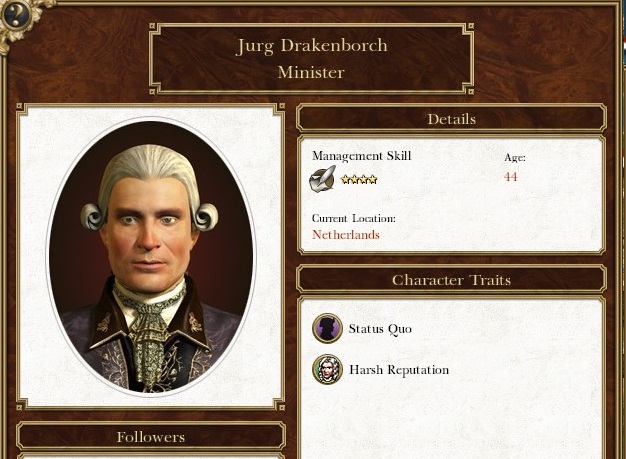
Drakenborch was a very hostile, oppressive man, continuing the procession of tyrannical ministers in India. Had the people of India not been so used to oppressive rule, men like Drakenborch likely wouldn't have lasted long, but severity was tolerated, and so they received severe ministers.
 In America, the Dutch minister was Evertsen Wendels, younger brother to the prior defence minister. He had assumed that he would take over the responsibilities as defense minister, but as Houtman was both better liked by the older Wendels, and more qualified for the position, Evertsen was left as the minister of America. Far from being grateful for the position, he took his frustrations out on whoever was about at the time.
In America, the Dutch minister was Evertsen Wendels, younger brother to the prior defence minister. He had assumed that he would take over the responsibilities as defense minister, but as Houtman was both better liked by the older Wendels, and more qualified for the position, Evertsen was left as the minister of America. Far from being grateful for the position, he took his frustrations out on whoever was about at the time.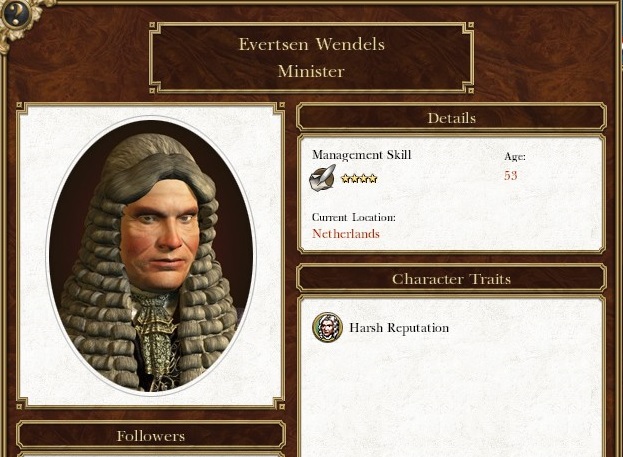
Evertsen was a fairly jealous, petty man. In all likelihood, he would have made a poor defence minister.
 The Dutch were now in a position of nearly unassailable power. The only threat remaining, the Polish forces to the East were forestalled by the Dutch armies that were still holding their ground at the Prussian state forestalling them. For the time being, the Dutch felt as though they were masters of the world, and in many respects, they could not be called wrong.
The Dutch were now in a position of nearly unassailable power. The only threat remaining, the Polish forces to the East were forestalled by the Dutch armies that were still holding their ground at the Prussian state forestalling them. For the time being, the Dutch felt as though they were masters of the world, and in many respects, they could not be called wrong. Next James Wilkinson will be looking at the history of football, and its evolution over the ages followed by world news. If you want news of the current war in the Middle East please channel in to BBC radio 1. David Stephenson will be presenting more on the 80 years war in 3 days.
Next James Wilkinson will be looking at the history of football, and its evolution over the ages followed by world news. If you want news of the current war in the Middle East please channel in to BBC radio 1. David Stephenson will be presenting more on the 80 years war in 3 days.